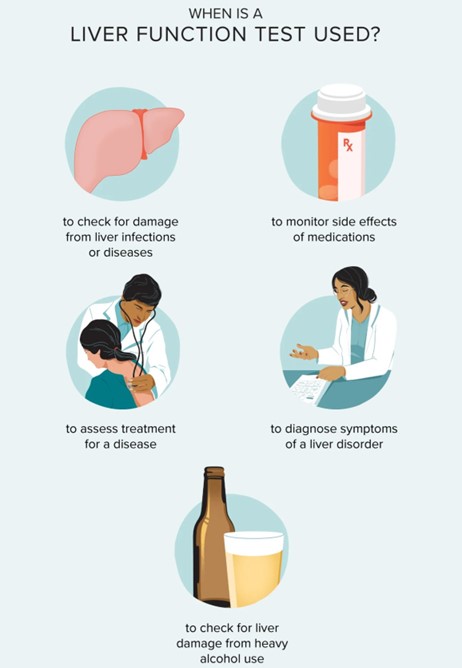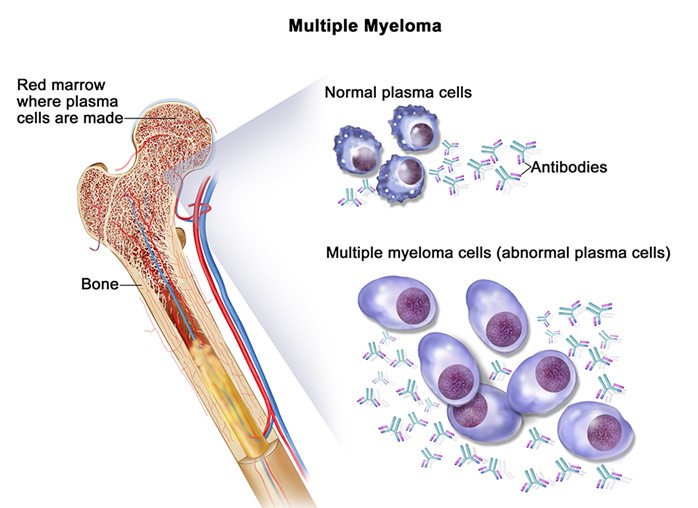A nurse is caring for a client who has chronic myeloid leukemia (CML) and is receiving imatinib, a tyrosine kinase inhibitor, as part of targeted therapy. Which of the following laboratory tests should the nurse monitor for adverse effects of this drug?
Liver function tests
Serum electrolytes
Coagulation studies
All of the above
The Correct Answer is A
Choice A reason:
Liver function tests should be monitored for adverse effects of imatinib, as this drug can cause hepatotoxicity and liver failure in some patients³⁴. These are serious side effects that can affect the liver's ability to metabolize drugs and toxins.
Choice B reason:
Serum electrolytes are not directly affected by imatinib, as this drug does not cause significant changes in sodium, potassium, calcium, or magnesium levels³. However, electrolyte imbalances may occur due to other factors such as dehydration, diarrhea, vomiting, or kidney problems.
Choice C reason:
Coagulation studies are not directly affected by imatinib, as this drug does not cause significant changes in prothrombin time, partial thromboplastin time, or international normalized ratio³. However, bleeding disorders may occur due to other factors such as thrombocytopenia, anemia, or vascular damage.
Choice D reason:
Liver function tests are the only laboratory tests that should be monitored for adverse effects of imatinib, as this drug can cause serious liver damage in some patients. The other tests are not directly affected by imatinib, but may be influenced by other factors or conditions. The nurse should also monitor for other signs and symptoms such as nausea, vomiting, diarrhea, rash, edema, fatigue, infection, etc. The nurse should report any abnormal findings to the doctor and intervene as needed.

Nursing Test Bank
Naxlex Comprehensive Predictor Exams
Related Questions
Correct Answer is ["A","B","C","E"]
Explanation
Choice A reason:
Numbness, tingling, or pain in the extremities are signs of peripheral neuropathy, which is a common and serious side effect of thalidomide³. This condition can affect the nerves that control sensation and movement in the arms and legs, and can lead to permanent nerve damage if not treated.
Choice B reason:
Drowsiness, dizziness, or confusion are signs of central nervous system depression, which is a common and serious side effect of thalidomide³. This condition can affect the brain's ability to regulate alertness, cognition, and coordination, and can increase the risk of falls, accidents, and injuries.
Choice C reason:
Constipation, nausea, or vomiting are signs of gastrointestinal distress, which is a common and mild side effect of thalidomide. This condition can affect the digestive system's ability to process food and fluids, and can lead to dehydration, malnutrition, and electrolyte imbalance if not managed.
Choice D reason:
Swelling, redness, or warmth in the legs are not directly related to thalidomide use, but may indicate a deep vein thrombosis (DVT), which is a blood clot that forms in a vein deep in the body. Thalidomide can increase the risk of DVT by affecting the blood's ability to clot normally. A DVT can be lifethreatening if it breaks off and travels to the lungs, causing a pulmonary embolism.
Choice E reason:
Rash, itching, or hives are signs of allergic reaction, which is a rare but serious side effect of thalidomide³. This condition can affect the skin's immune response to the drug, and can lead to severe skin reactions such as StevensJohnson syndrome or toxic epidermal necrolysis if not treated.

Correct Answer is ["A","B","E"]
Explanation
Choice A reason:
Bone marrow suppression is an adverse effect of dactinomycin, which is an antineoplastic antibiotic that works by binding to DNA and inhibiting RNA synthesis. Bone marrow suppression is the decrease in the production of blood cells, such as red blood cells, white blood cells, and platelets. This can cause anemia, increased risk of infection, and bleeding problems. The nurse should monitor the complete blood count and differential, which measure the number and type of blood cells in a sample of blood. The nurse should report any abnormal results to the provider and provide supportive care as ordered³.
Choice B reason:
Skin reactions are an adverse effect of dactinomycin, which can cause inflammation, rash, acne, erythema multiforme, or increased pigmentation of previously irradiated skin. Skin reactions can occur due to the direct toxicity of dactinomycin on the skin cells or due to the hypersensitivity or allergic reactions induced by dactinomycin. The nurse should monitor the skin appearance and texture and report any changes to the provider. The nurse should also provide skin care and topical agents as ordered³.
Choice E reason:
Extravasation injury is an adverse effect of dactinomycin, which can occur when the drug leaks out of the vein into the surrounding tissue during intravenous infusion. Extravasation injury can cause severe pain, swelling, redness, blistering, ulceration, or necrosis of the affected tissue. The nurse should monitor the infusion site and stop the infusion immediately if extravasation occurs. The nurse should also elevate the affected limb and apply cold compresses as ordered. The nurse should consult with the provider for further management of extravasation injury³.
Choice C reason:
Cardiotoxicity is not an adverse effect of dactinomycin, but rather of doxorubicin, which is another antineoplastic antibiotic that can cause damage to the heart muscle or valves. Cardiotoxicity can manifest as acute or chronic heart failure, arrhythmias, or myocardial infarction. The nurse should monitor the blood pressure, heart rate, oxygen saturation, and electrocardiogram (ECG) regularly and report any abnormal findings to the provider .
Choice D reason:
Pulmonary fibrosis is not an adverse effect of dactinomycin, but rather of bleomycin, which is another antineoplastic antibiotic that can cause scarring of the lung tissue. Pulmonary fibrosis can manifest as shortness of breath, coughing, or reduced lung function. The nurse should monitor the respiratory rate, breath sounds, and chest xray regularly and report any abnormal findings to the provider .
Whether you are a student looking to ace your exams or a practicing nurse seeking to enhance your expertise , our nursing education contents will empower you with the confidence and competence to make a difference in the lives of patients and become a respected leader in the healthcare field.
Visit Naxlex, invest in your future and unlock endless possibilities with our unparalleled nursing education contents today
Report Wrong Answer on the Current Question
Do you disagree with the answer? If yes, what is your expected answer? Explain.
Kindly be descriptive with the issue you are facing.
